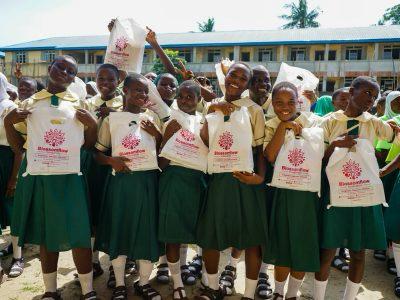
By Joan Faluyi
Period poverty is an issue that has, for far too long, gone unnoticed. In a world where conversations about health and wellness dominate our lives, the basic reality of menstruation, an experience shared by half the world’s population, is still shrouded in stigma. The inability to afford sanitary products – a condition termed period poverty – is having a direct impact on the physical and mental health of girls and women.
As we unearth the links between menstrual hygiene and overall health, it becomes clear that addressing period poverty could help mitigate various health risks, including infections, reproductive health issues, and psychological stress. Beyond the discomfort and the social stigma, the cost of inaction is far too high to ignore.
Silent health crisis
When girls and women have access to safe and affordable sanitary materials to manage their menstruation, they significantly reduce their risk of infections. But the sad truth is that millions around the world, and particularly in Nigeria, lack these essential products. This shortage forces them to rely on unsanitary alternatives, such as old cloths, rags, or even newspapers. The lack of hygienic options doesn’t only cause discomfort but can have cascading health consequences that ripple through their reproductive and sexual health.
Poor menstrual hygiene can result in serious infections, including reproductive tract infections (RTIs) and urinary tract infections (UTIs), which, if left untreated, may lead to more severe complications. For instance, RTIs are known to contribute to infertility and could also increase the likelihood of complications during pregnancy and childbirth. Additionally, using dirty or unsuitable materials during menstruation can heighten the risk of contracting infections such as bacterial vaginosis and sexually transmitted infections (STIs).
What many may not realise is how neglecting simple hygiene practices like washing hands after changing menstrual products can further worsen the issue. Infections such as hepatitis B and thrush can be spread this way, increasing health risks exponentially.
Studies indicate that girls who receive sanitary pads are significantly less likely to contract bacterial vaginosis and STIs. This is a key finding that underscores the direct relationship between menstrual hygiene and sexual health. By addressing period poverty, we could potentially reduce the spread of these infections, improving health outcomes for girls and women across the country.
Health risk extending beyond physical
The health implications of period poverty stretch beyond the physical. The psychological burden placed on women and girls is another critical aspect of this crisis. The stress of dealing with periods in an unhygienic, unsafe, or uncomfortable manner can contribute to feelings of shame and embarrassment. In cultures where menstruation is still a taboo topic, this stress is compounded by societal stigma, leading to anxiety, depression, and a general sense of worthlessness.
In many cases, young girls are forced to miss school because they don’t have access to sanitary products. The impact of these absences on their education and future opportunities is well-documented. However, what is often less understood is the emotional toll of this exclusion. Feeling ostracised from their peers and falling behind in their studies can lead to poor mental health, further deepening the cycle of poverty and disempowerment.
Breaking this cycle requires a concerted effort to normalise menstruation as a natural and healthy process. Empowering girls with knowledge about their bodies and providing them with the necessary tools to manage their menstruation safely is crucial for improving their overall mental wellbeing.
Reproductive health and wider impact
Reproductive health is deeply affected by poor menstrual hygiene, and period poverty can create a domino effect. For instance, infections like RTIs and UTIs can eventually cause infertility. The fear of infertility looms large for many women, as societal pressure often places tremendous value on their ability to bear children. Therefore, addressing menstrual hygiene isn’t just about preventing infections; it’s about safeguarding the future reproductive health of millions of women.
Teen pregnancy is another area where period poverty plays a quiet but significant role. Studies have shown that girls who are provided with sanitary pads and education about menstruation experience reduced rates of teen pregnancy. The link is clear: when girls feel more in control of their bodies and better understand their reproductive health, they are empowered to make informed decisions about sex and contraception. This directly impacts maternal health outcomes and could potentially reduce maternal mortality, a pressing issue in many developing countries, including Nigeria.
Combating period poverty: A call for action
Period poverty is not an isolated issue; it’s a multifaceted problem that demands a holistic approach. Governments, health organisations, and communities must step up to ensure that sanitary products are affordable and accessible to all who need them. There are also essential roles for schools and public health campaigns in educating girls about menstruation and empowering them to manage it with dignity and safety.
Joan Faluyi writes from the Blossomflow foundation
Disclaimer
Comments expressed here do not reflect the opinions of Vanguard newspapers or any employee thereof.